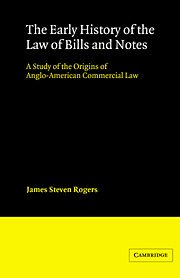Description
The Early History of the Law of Bills and Notes
A Study of the Origins of Anglo-American Commercial Law
Cambridge Studies in English Legal History Series
Author: Rogers James Steven
A history of an important branch of English commercial law, the law of bills and notes.
Language: English
Subject for The Early History of the Law of Bills and Notes:
Approximative price 45.15 €
Subject to availability at the publisher.
Add to cart
Publication date: 12-2004
296 p. · 14x21.6 cm · Paperback
296 p. · 14x21.6 cm · Paperback
Description
/li>Contents
/li>
This study traces the history of the law of bills and notes in England from medieval times to the period in the late eighteenth and early nineteenth centuries when bills played a central role in the domestic and international financial system. It challenges the traditional theory that English commercial law developed by incorporation of the concept of negotiability and other rules from an ancient body of customary law known as the law merchant. Rogers shows that the law of bills was developed within the common law system itself, in response to changing economic and business practices. This account draws on economic and business history to explain how bills were actually used and to examine the relationship between the law of bills and economic and social controversies.
Preface; Table of cases and precedents; Note on citation; Introduction; 1. The central courts, commercial law, and the law merchant; 2. Early exchange transactions: commercial practice; 3. Early exchange transactions: private law; 4. Early exchange transactions: public law and policy; 5. From exchange transactions to bills of exchange: the transformation of commercial practice; 6. The custom of merchants and the development of the law of bills; 7. The civilians and the law of bills in the seventeenth century; 8. Transferability and negotiability; 9. The law of bills and notes in the eighteenth century; 10. The problem of accommodation bills; Conclusion; Bibliography; Index.
© 2024 LAVOISIER S.A.S.



